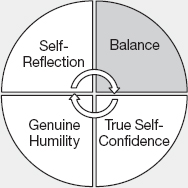Early on in my career, I perceived the world as black and white, with virtually no gray. Given my background in mathematics, economics, and finance, I had the impression that the right answer to nearly every question could be derived simply by performing calculations and solving the problem. What else was there to think about? I couldn't understand why bosses struggled so hard to make decisions.
As a young manager, I prided myself on being decisive. I was not going to be one of “those guys” I had observed during my days in “the cube,” as I called the cubicles—the managers who, for some unknown reason, could not make decisions as they painstakingly weighed all the pros and cons. Over time, though, a strange thing began to happen. As I became more mature and experienced, self-reflection enabled me to see that issues were more complex than I had previously realized. Suddenly, shades of gray began to creep into my black-and-white world. In short, I discovered the importance of balance.
Balance is the second of the four principles of values-based leadership, and closely follows the first principle, self-reflection. Through balance and self-reflection, I gain a clearer perspective on virtually any topic or issue that I encounter. Balance is the ability to see issues, problems, and questions from all angles, including from differing viewpoints, even those that are diametrically opposed to mine. With balance, I am able to make decisions explicitly with an understanding of the broad impact, instead of focusing narrowly.
In all aspects of your life, professionally and personally, pursuing balance will give you a richer, more holistic perspective. You move beyond what you see and know in order to consider what others have to say. Sometimes you will change your mind; at other times, your opinions will be affirmed. Whatever the outcome, you will become more knowledgeable and gain confidence in your decision making because you are more balanced.
In the pursuit of balance, you become stronger and more informed as you genuinely seek input, opinions, and feedback from all members of your team before making a decision. You value balance as part of the decision-making process, knowing that no matter how senior you are in the organization or how many years you have been in the business, you cannot possibly know everything. By pursuing balance, you can also communicate your views much more effectively. Instead of engaging in a tit-for-tat argument, you can usually draw parallels where the various viewpoints agree, and explore contrasts where they do not.
Whether you are a manager with two or three direct reports or the CEO of a large publicly traded company, balance will help you become a well-rounded, global-thinking person with more meaningful and satisfying interactions with others. People will know that you are listening and, even more important, that they are being heard. Your ability to influence others will be even greater when you take the lead in seeking to understand first, before you are understood.

 BALANCE AND PERSPECTIVE
BALANCE AND PERSPECTIVE